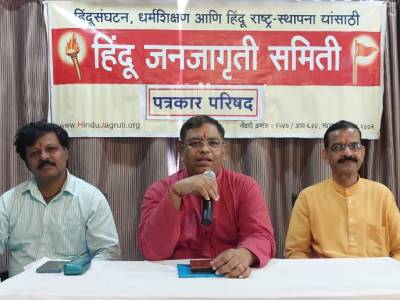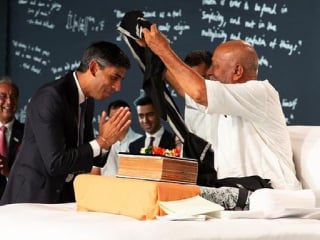Phalgun Shuklapaksha 13, Kaliyug Varsha 5116
By Maria Wirth
H. H. Dalai Lama said during the last Kumbh Mela in Haridwar that “India has great potential to help the world.” He added that already as a youth in Lhasa he was greatly impressed with the richness of Indian thought, and went as far as to say “Everything in my head is from India. I am a son of India.”
In India, however, there are two camps. One agrees with the Dalai Lama. The other does not and even ridicules anyone who claims that India’s heritage has great value.
I belong to those who agree with the Dalai Lama. The reason is simple: It is true. India does have great potential to help the world. There is plenty of evidence. Just read some of the ancient texts, for example the Upanishads. The insights contained therein are mind boggling. For me, who grew up as a Christian and felt dissatisfied with what I was taught to believe, it was all the more obvious. Christianity is no equal to the Indian tradition.
Here I refer only to the philosophical and religious angle. Yet India’s heritage contains amazing knowledge in all possible fields – from science to music, from architecture to astronomy to medicine and so on. It is a huge treasure, in spite of the fact that a lot of this treasure has been lost or destroyed. Not without reason India is called the cradle of civilization and “Indian wisdom” is proverbial in the west.
Now, since it is clear that the Dalai Lama is right, how can there be people who disagree?
This is a long story that started in 1835 when a politician called Thomas Macauley pleaded in the British Parliament to replace the Sanskrit gurukuls in India with English education. He argued that if Britain wants to successfully subdue Indians, they need to be cut off from their culture.
Macauley got his way. From then on, the Indian elite had to send their children to English medium schools, if they wanted them to make it in life. Naturally, the kids didn’t hear much about their own great culture and whatever little they heard, was negative. And since they didn’t learn Sanskrit, they could not check it out for themselves.
Ironically, this happened at a time, when the European elite had discovered Sanskrit and India’s wisdom and were stunned by its depth. This discovery contributed to the so called era of enlightenment in Europe which resulted in a separation between state and Church.
Yet Indian children were taught from mid-19th century onwards, how great and accomplished Britain was. It suited the colonial masters to have “educated natives” who held them and their lifestyle, including their religion, in high esteem. In return, they, especially those who had converted to the western religions, were allowed to feel superior to the ‘superstitious Indian masses’.
Brainwashing works. And Indians proved that it lasts even over several generations. Those who claim that the Dalai Lama is wrong are generally “Macauley’s children” who feel proud that they are fluent in English and don’t realize that they have been uprooted in the interest of their former masters.
These people never delved into the rich Indian heritage that had impressed the Dalai Lama. Yet in spite of their ignorance, they claim that India has nothing to offer. They don’t really claim it: they shout it, so that any opposition to their view cannot be heard. Of course this is not a healthy state of affairs, but it plays out often on Indian news channels: Macauley’s children (or should I call them ‘anti-Hindu brigade’?) accuse and insinuate about Hinduism what the British convent schools had taught them.
Missionaries have always maligned Hinduism, but in the recent decades, a new, dangerous insinuation is noisily propagated. Christian leaders support it and the international media eagerly picks it up. It is this:
“Hindus are intolerant of other religions. They hate members of other religions, and now, since there is a BJP government, they show their agenda openly. They want a Hindu India and obliterate other religions. The rising incidents of attacks on churches prove it.”
“Who will stop this hate” kept flashing on the screen of a news channel, after a stone had damaged a church window. Such insinuations are unbearably unfair. Hindus (other Indian traditions included) are by far the most tolerant people on earth. There is no other country, where minority Christians, Jews and Muslims are as safe as in India. And yet there seems to be a coordinated effort by Indians and westerners, which is gleefully supported by the media, to paint Hindus as hateful of other religions.
“Attacks on churches have a pattern” they shout, when there is no pattern. After a burglary of 8000 Rupees in a Christian school, Macauley’s children demanded a statement from the Prime Minister in spite of the fact that the principal of the school (a nun) and the police had stated that it was theft without any communal angle. When children threw a stone at a church, it made national news for hours, and will probably be eagerly included in international news reports that “incidents of attacks on churches are rising in India”.
In contrast, attacks on temples are not considered newsworthy. In 2014, 206 temples and 3 churches were vandalized. If vandalism of a place of worship is expected to have been committed by culprits from another religion, then the number of attacks on churches should be a multiple of the attacks on temples, because Hindus are the great majority. How come that far more temples were vandalized?
The point is that the anti-Hindu brigade is not interested in the truth. They want that attacks on churches are rising, at least in the perception of people the world over. They want that ‘Hinduism’ evokes disgust. What could be the reason?
President Obama’s recent remarks may give a hint. At a prayer breakfast in the White House a few days after the Jordanian Air Force pilot was brutally burned alive by ISIS, he tried to give the impression that Islam, Christianity and Hinduism are all in the same boat. They all have committed unspeakable atrocities. “Even Gandhi would be shocked”, he said referring to India.
Now this attempt to draw Hinduism in was blatantly dishonest. While Christianity and Islam indeed have a terrible historical record, Indian traditions do not. There were many different ways of worship in India yet all lived peacefully together – till the dogmatic religions, Islam and Christianity, arrived on the scene, and Hindus became their victims.
Instead of trying to pull Hinduism down to the level of the dogmatic religions in the perception of others, it would be better to find out what makes dogmatic religions prone to violence and eliminate those aspects.
One major aspect is the fact that the dogmatic religions mix up the path with the truth. They claim that only one path is true – their own – and all have to follow this one path, when in reality only one truth is true and paths are many. The Rishis declared “Truth is one; the sages call it by many names”.
The problem with the dogmatic religions is, however, that they don’t enquire into what is really true. They think that truth is the opposite of a lie, and insist that the story they tell about God is true and not a lie. They never deeply reflected on what is really and absolutely true about us and the universe.
Indian rishis did reflect and came up with deep insights Truth is the eternal, unchanging, infinite, conscious basis that upholds this ever changing universe. Names and forms are only fleeting and impermanent appearances on this basis which is among others described as Sat-Chit-Ananda.
The Rishis claim that the goal of life is to discover this truth in us and they show many ways, depending on the tendencies of different persons – bhakti, jnana, karma, yoga, etc. The Hindu tradition is open-minded: If devotion to Krishna helps you, it is fine. If devotion to Jesus helps you, it is also fine.
Will the dogmatic religions correct themselves? Will they agree that truth is one and different paths are possible? It seems so natural and would make such big positive change in the world.
Yet it is not likely that those religions will give up the power that comes with “we alone have the truth” without being pressurized. They keep defending their flawed religion, and one major aspect of this defense is to malign Hindu Dharma. The reason may be that they are aware that if people knew the truth about Hindu Dharma, they would appreciate it as it makes far more sense than the dogmatic religions.
Indians needs to ponder how to translate the potential of their tradition to help the world into reality. Mainstream media clearly sides with dogmatic religions and its influence is close to almighty. Yet those religions have serious drawbacks. Their followers are left stranded regarding the meaning of life. Depression is rampant in the Christian west and Muslim youth is horribly misguided to believe that killing unbelievers makes their lives meaningful and will fetch them a reward in afterlife.
If Hindus and Buddhists join together and propagate India’s wisdom, their voice is more likely to be heard. At the same time, they need to expose absurd dogmas and forcefully demand at international forums that nobody can claim without any evidence that non–Christians (and non-Muslims respectively) will burn in hell for all eternity.
If this is not hate speech, what is? If this is not against human rights, what is?
Voltaire said: “Those who can make you believe in absurdities can make you commit atrocities.” The belief in absurdities needs to be stopped. Then atrocities in the name of religion will stop automatically.
Source : Maria Wirth’s blog





